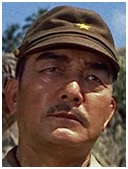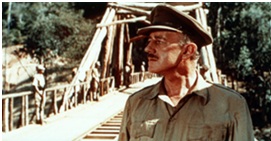|
 |
|
 |
|
|
||
The Bridge on the River Kwai - Ethics and War
The Bridge on the River Kwai (1957)
Famous for...
Why was the bridge important? The Japanese wanted it to transport troops and supplies. In reality two bridges were built (one wooden and a steel bridge that is still used today). The leader of their construction, Lieutenant Colonel Philip Toosey, pictured right, was totally anti-Japanese unlike his counterpart in the film, Colonel Nicholson (played by Alec Guinness). Based on... Le Pont de la Riviére Kwai, a French novel by Pierre Boulle (pictured right).
Director David Lean (pictured right), also director of:
Oscars Seven including;
Key characters Colonel Nicholson ( Alec Guinness), leader of the British prisoners of war - pictured
right below. Colonel Saito (Sessue Hayakawa), prison camp commandant. Commander Shears (William Holden), American naval officer and prisoner. Major Clipton (James Donald), British medical officer. Major Warden (Jack Hawkins), British army officer. Lieutenant Joyce (Geoffrey Horne), Canadian army officer.
The story Some British soldiers (led by Colonel Nicholson) join the American Commander Shears (pictured right) in a Japanese prisoner of war camp in Siam (now Thailand). The camp commandant Colonel Saito tells the British to start manual work to build a railway bridge over the River Kwai. But Nicholson:
He is imprisoned alone in a boiling hot tin box, but he refuses to give in. Saito reluctantly agrees to his demands, and a triumphant Nicholson (pictured right being released) decides to build the bridge better and faster than the Japanese would have done. Meanwhile Shears has managed to escape to Colombo in Ceylon (now Sri Lanka). He reluctantly agrees to join in a
commando mission to blow up the Kwai bridge with two officers
(Sears,left, and Warden, middle, and Joyce are pictured right) Major Clipton, the British medical officer, is bewildered by Nicholson’s:
Meanwhile the commandos have reached the bridge. While the prisoners are celebrating its completion in the camp, Shears and Joyce wire explosives on to it under cover of darkness. The next day a Japanese train, full of soldiers and important officials, will cross the bridge, and Warden wants
to blow them up, too. At dawn Nicholson makes a proud final inspection of the bridge. The river has receded, and he notices the detonator wire (pictured right). Accompanied by Saito, he pulls it up towards Joyce who stabs Saito to death. Nicholson yells for help and then tries to stop Joyce getting to the detonator. Joyce is shot and Shears is also killed just before he reaches Nicholson who then realizes his crime of collaborating with the enemy. Mortally wounded, he falls on the detonator just in time to destroy the bridge and the train. Clipton sees the destruction and, in disbelief, says one of the most famous final lines in cinema history: “Madness!...Madness! Madness!”
Lessons for ethics and war 1. Do your duty Nicholson is a man of principle who fights for his officers’ right not to do manual work, even after beatings from the Japanese and gruelling solitary confinement. The Japanese camp commandant, Saito (pictured right), is also a man of honour who is prepared to commit suicide, if he fails to build the bridge on time. Shears learns to do his duty, despite his reluctance to join the mission to destroy the bridge. Early in the film he is only interested in self-preservation, but he ends up sacrificing his life.
2. People and purpose The British are happiest when they are building the bridge, because they take pride in their work. On its
completion (pictured right below), Nicholson congratulates them for having:
The bridge has given him the greatest sense of achievement in a 28 year army career during which, he says, he has “hardly made any difference at all”. Major Warden’s mission is also successful, because it is totally focused on the aim of destroying the bridge.
3. Work out what is right Nicholson gets so carried away with the bridge that he forgets that building it so well is collaborating with the enemy, as Clipton (pictured right) rightly tells him. He even encourages the wounded to work. Only at the end of the film does Nicholson realize what he has done. He is a stickler for the law (even saying that his men shouldn’t escape because they were ordered to surrender). But Shears tells him that law and civilization don’t apply in war. For example, Joyce (like anybody else) feels a natural revulsion to killing, but he steels himself to kill Saito. 4. War is wicked but sometimes necessary Clipton is appalled by the bridge’s destruction, but he also criticizes Nicholson’s collaboration with the Japanese whose military aggression has made war sadly necessary. But war musn't destroy people's humanity. Shears tells Warden: “The only important thing is how to live like a human being”
Key quotes on war Madness!...Madness! Madness!, Major Clipton on seeing the bridge’s destruction. Do not speak to me of rules. This is war! This is not a game of cricket!, Saito
Key quote on law Without law, Commander, there is no civilization, Nicholson (to Shears).
Key quote on success and happiness The only important thing is how to live like a human being, Shears
Key quote on death But there are times when suddenly you realize you’re nearer the end than the beginning, Nicholson (commenting on his life to Saito after completing the bridge).
Key quote on leadership It is essential for an officer to have that respect...If he loses it, he ceases to command. And what happens then? Demoralization and chaos , Nicholson (to Saito).
Key quote on motivation Be happy in your work, Saito (his motto for the prisoners)
Key quote on careers And you wonder, you ask yourself, what the sum total of your life represents. What difference your being there at any time made to anything, Nicholson
Two film websites to recommend 1. filmsite.org (run by Tim Dirks). 2. aveleyman.com (run by Tony Sullivan) |
|
|
||
|
|
||
| Copyright © wisdomtowin.com 2025 All Rights Reserved | ||
|




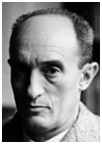
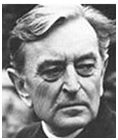


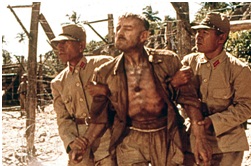
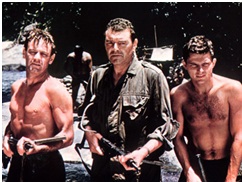 :
:
